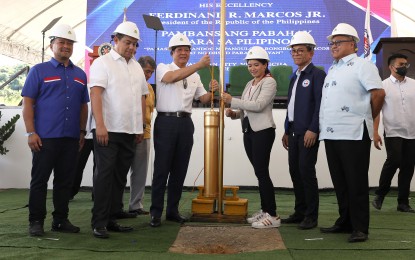
DECENT HOMES. President Ferdinand R. Marcos Jr. (3rd from left), together with Palayan City Mayor Viandrei Nicole Cuevas (3rd from right), lowers the time capsule during the groundbreaking for the Palayan City Township Housing Project in Nueva Ecija province on Dec. 21, 2022. The community township project under the Pambansang Pabahay Para sa Pilipino Program will give rise to 44 towers with 11,000 housing units. (PNA photo by Rolando Mailo)
MANILA – The Department of Human Settlements and Urban Development (DHSUD) has been working double-time to confront the country’s housing need head on.
With self-made businessman Secretary Jose Rizalino Acuzar at the helm, DHSUD has introduced the administration’s Pambansang Pabahay para sa Pilipino: Six Million Housing Priority Program to finally address the 6.5 million housing needs of the country.
The program is bringing in bold and innovative strategies as the flagship housing program of no less than President Ferdinand R. Marcos Jr.
In barely five months, the program has elicited positive responses and secured the overwhelming support of relevant stakeholders which resulted in its fast rollout immediately after its launch.
Marcos has expressed his full confidence in the program, dubbing it as the solution to the country’s housing problem, if the goal to build 1 million housing units per year is achieved.
Five times the need, five times the effort
Records show that the annual average housing production in the past years is pegged at approximately 200,000 housing units. At this rate, the gap in production would balloon at an unprecedented proportion, if not properly acted upon. Thus, the target to produce five times more every year came to being.
Acuzar has promised to work “five times harder” to fulfill his mission as the housing czar of the Marcos administration.
The first few months of his stint as secretary, nonetheless, have been productively spent with rigorous technical consultations with industry experts and engagements with relevant stakeholders who are key to the program’s success.
Initially, DHSUD with its newly-appointed officials, has been actively involving the key players expected to participate in the program.
First and foremost are the local government units (LGUs), which will serve as the implementing arm of the program in terms of allocating land resources and other forms of assistance. As implementing arms, LGUs are tasked to identify prospective beneficiaries.
As of Dec. 21, DHSUD has sealed 43 memorandums of understanding (MOUs) with LGUs in Luzon, Visayas and Mindanao. It also led the groundbreaking ceremonies with 12 LGUs, signaling the official start of the projects.
In a show of his trust and support, President Marcos has visited the Bagong Sibol Housing Project in Barangay Nangka, Marikina City in October and inaugurated the Palayan City Township Housing Project in Barangay Atate, Palayan City, Nueva Ecija in December.
Both projects are touted to become model townships that will provide not only shelters to the beneficiaries but also present opportunities for social and economic growth. With master plans that include schools, market places, open parks and health stations, the soon-to-be residents will enjoy the amenities they will require in their day-to-day lives.
Before this, the President has also announced the impending issuance of an executive order that will allocate idle government lands for housing projects.
DHSUD has estimated around 16,000 hectares of idle land resources which can be used for housing.
Massive support
Other organizations in the bureaucracy have also offered involvement based on their respective mandates to be a part of the Pambansang Pabahay, such as the League of Municipalities of the Philippines, League of Cities of the Philippines, Bases Conversion and Development Authority, Land Registration Authority, among other groups.
In an outright declaration of their intent to participate, some provincial LGUs have also signed MOUs with DHSUD, particularly on social preparation, informal settler families census enumeration, socio-economic profiling and the establishment of social parameters.
On the financial side, heads of government financial institutions, including the Home Development Mutual Fund or Pag-IBIG Fund, Development Bank of the Philippines, Social Security System, Government Service Insurance System and Land Bank of the Philippines have formalized their support through an MOU with DHSUD as a testament to their commitment toward realizing the Pambansang Pabahay’s goal.
President Marcos has also facilitated initial discussions between DHSUD and private banks on how the latter can help further fuel the program’s course.
DHSUD’s multi-lateral organization partners, Habitat for Humanity and UN Habitat, have continuously extended assistance and vowed on doing so in aid of the human settlements and urban development sector.
Housing production is another area that requires extensive participation of the private sector to ensure the program’s realization and sustainability. Hence, various developer and construction groups have also been tapped. In return, they have reassured DHSUD of their steadfast support in producing the target of 1 million housing units per year.
Meanwhile, the significant backing of both chambers of Congress is also a big boost to the program’s legislative agenda, including funding support. (with reports from Zaldy De Layola/PNA)
